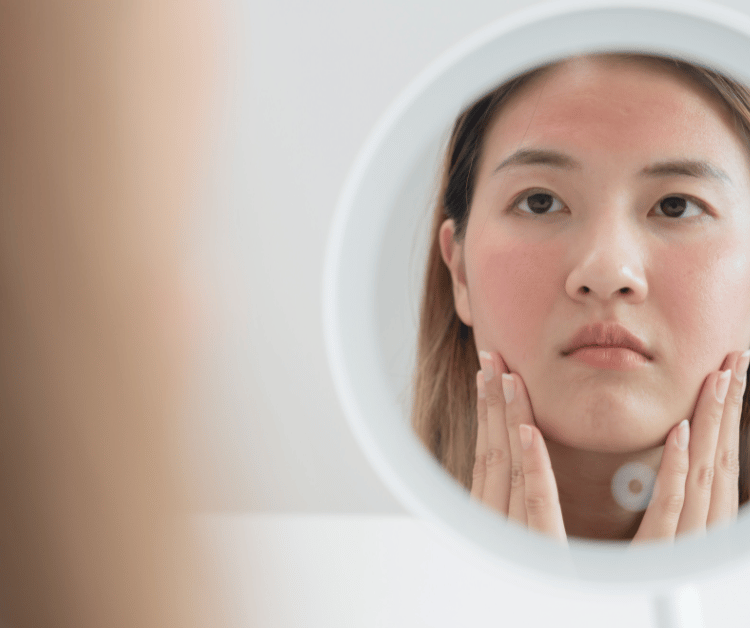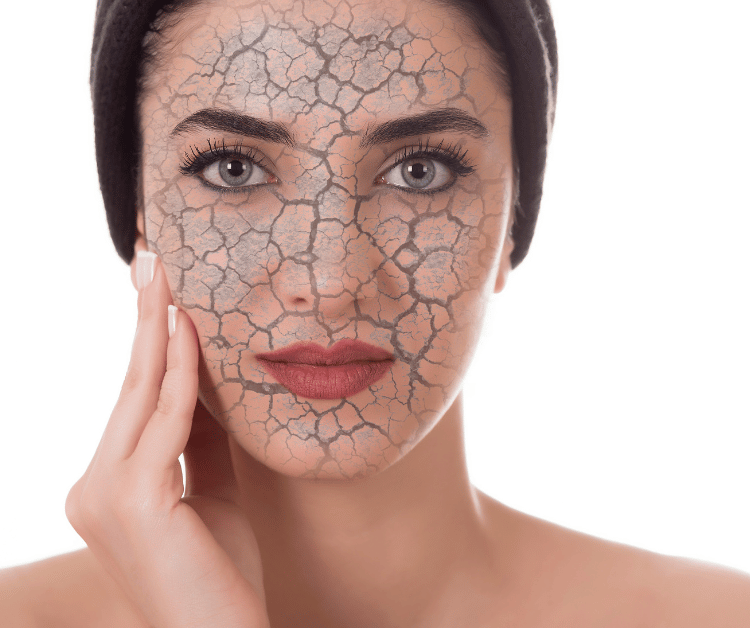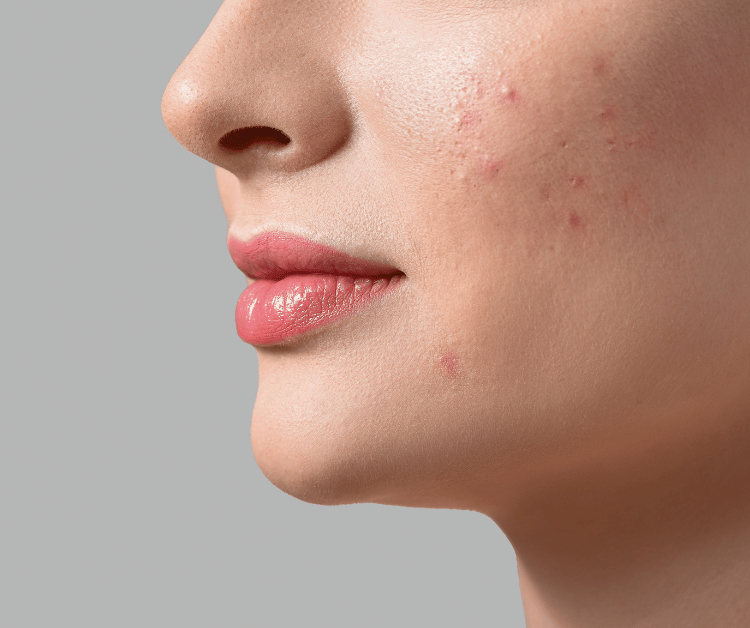Do you fit into the sensitive skin type? According to an Aveeno study, over 70% of adults have sensitive skin.
Knowing which skin type you have is a beautiful, powerful beauty skill.
In this article, you’ll discover the essential indicators to watch for if you suspect you might have sensitive skin and belong to this distinctive and lovely skin type.
What is the Sensitive Skin Type?
Sensitive skin is highly reactive. It can quickly develop redness, itching, or discomfort, often due to triggers like environmental factors, certain skincare products, fragrances, and even stress. Proper care for sensitive skin is crucial, involving the use of mild, hypoallergenic skincare products and a vigilant avoidance of known triggers.
- Sensitive skin reacts swiftly to various triggers.
- Common reactions include redness, itching, and discomfort.
- Triggers encompass environmental factors, specific skincare products, fragrances, and stress.
- Effective care entails using gentle, hypoallergenic products and diligently avoiding triggers.
Signs of Sensitive Skin Concerns
The 9 key signs that you may have sensitive skin include: frequent redness, irritation and itchiness, burning and stinging sensations, dryness and tightness, flare-ups, skin allergies, prone to breakouts, visible blood vessels, and reactivity to products.
Let’s take a deeper dive into each one.
1. Frequent Redness

Is persistent redness a concern for you? It could be a sign that you have sensitive skin. Redness often indicates heightened skin reactivity and sensitivity, which are common traits of this skin type. If you frequently experience redness, especially in response to various triggers like skincare products, environmental factors, or specific conditions, it’s a strong indication that your skin may fall into the sensitive category. Understanding your skin’s sensitivity is essential for adopting a tailored skincare routine to minimize redness and maintain a comfortable complexion.”
Highlights:
*As an Amazon Associate, we earn from qualifying purchases at no additional cost to you.
- Persistent redness may indicate sensitive skin.
- Redness is a sign of heightened skin reactivity and sensitivity.
- Frequent redness in response to triggers suggests a sensitive skin type.
- Tailoring your skincare routine is crucial to minimize redness and maintain skin comfort.
2. Irritation and Itchiness

To determine if your itchiness is related to sensitive skin, pay attention to persistent itching, redness, or rash on your skin, especially in response to specific triggers like skincare products or environmental factors.
Consider your skin’s overall sensitivity and its reactions to different products and conditions.
If certain products consistently lead to itchiness or if you have a history of skin allergies, it could be a sign of sensitive skin.
Identifying patterns in your itchiness and consulting a dermatologist if needed can help confirm the link between your itchiness and sensitive skin.
Highlights:
- Persistent itching, redness, or rash may indicate sensitive skin.
- Observe your skin’s reactions to different products and environmental factors.
- Consistent itchiness from specific products or a history of skin allergies are potential signs.
- Identifying patterns and seeking a dermatologist’s advice can help confirm the connection between itchiness and sensitive skin.
3. Burning and Stinging Sensation

Experiencing burning and stinging sensations on your skin? These sensations can be indicative of sensitive skin and are worth exploring further.
These discomforting sensations often occur when the skin’s natural barrier is compromised, allowing irritants to penetrate more easily. Sensitive skin is prone to heightened reactivity, which can lead to these sensations in response to various triggers, such as certain skincare products, weather conditions, or allergens. If you frequently experience burning and stinging, especially in reaction to specific stimuli, it’s likely that you have sensitive skin, and adopting a gentle skincare routine tailored to your skin’s needs can help alleviate these symptoms.
Highlights:
- Burning and stinging sensations on the skin can be signs of sensitive skin.
- These sensations often result from a compromised skin barrier and heightened reactivity.
- Sensitive skin can react strongly to various triggers like skincare products, weather conditions, or allergens.
- Adopting a gentle skincare routine can help mitigate burning and stinging sensations associated with sensitive skin.
4. Dryness and Tightness

Do you often experience persistent dryness and tightness in your skin?
These symptoms can collectively suggest that you have sensitive skin. Dryness and tightness are common manifestations of heightened skin reactivity and sensitivity, which are key characteristics of this skin type. If you frequently encounter these discomforts, particularly in response to various triggers like skincare products, environmental factors, or specific conditions, it’s a strong indication that your skin may be sensitive. Recognizing these signs is crucial for managing these issues and maintaining your skin’s comfort and well-being.
Hightlights:
- Persistent dryness and tightness may indicate sensitive skin.
- These symptoms are associated with heightened skin reactivity and sensitivity.
- Frequent discomfort in response to triggers suggests a sensitive skin type.
- Understanding these signs is essential for effectively managing and maintaining skin comfort.
5. Flare-ups
Skin flare-ups, characterized by heightened skin reactivity and sensitivity, can be indicative of sensitive skin. These flare-ups often manifest as uncomfortable reactions to triggers like skincare products, environmental factors, or specific conditions. If you frequently encounter these flare-ups, it’s a strong indication that your skin may be sensitive. Recognizing and understanding these flare-ups is crucial for managing them and maintaining your skin’s comfort and well-being.”
Highlights:
- Skin flare-ups, linked to heightened reactivity and sensitivity, may indicate sensitive skin.
- They commonly result from reactions to triggers like skincare products, environmental factors, or specific conditions.
- Frequent flare-ups suggest a sensitive skin type.
- Managing and understanding these reactions is essential for maintaining skin comfort.
6. Skin Allergies
Skin allergies, characterized by hypersensitivity reactions of the skin, can be indicative of sensitive skin.
Allergic responses such as itching, redness, rashes, and hives are common manifestations of heightened skin reactivity and sensitivity, which are key characteristics of this skin type.
If you frequently experience skin allergies, particularly in response to various triggers like skincare products, environmental factors, specific ingredients, or allergens, it’s a strong indication that your skin may be sensitive.
Highlights:
- Skin allergies, involving hypersensitivity reactions, may indicate sensitive skin.
- Allergic responses include itching, redness, rashes, and hives, often due to heightened skin reactivity and sensitivity.
- These reactions can be triggered by various factors, including skincare products, environmental factors, specific ingredients, or allergens.
- Frequent skin allergies suggest a sensitive skin type.
- Managing and addressing these reactions is essential for maintaining skin comfort.
7. Prone to Breakouts

Having sensitive skin can make you more prone to breakouts, like acne or blemishes.
This happens because your skin reacts strongly to various things, and it can be triggered by skincare products, the environment, hormones, or specific conditions.
If you often get these breakouts, it’s a sign that your skin is sensitive. It’s important to recognize and deal with these breakouts to keep your skin comfortable and healthy.
Highlights:
- Sensitivity can lead to breakouts like acne.
- Your skin reacts strongly to various factors, causing breakouts.
- Triggers can include skincare products, the environment, hormones, or specific conditions.
- Frequent breakouts indicate sensitive skin.
- Managing breakouts is vital for skin comfort and health.
8. Visible Blood Vessels
If you see visible blood vessels on your skin, it could mean you have sensitive skin.
This happens because your skin is more sensitive and reactive, which makes those blood vessels near the surface show up.
If you often notice these visible blood vessels, especially when you’re exposed to things like temperature changes or certain skincare products, it’s a sign that your skin is sensitive.
Recognizing this can help you take better care of your skin to keep it comfortable and healthy.
Highlights:
- Visible blood vessels may indicate sensitive skin.
- Sensitive skin makes surface blood vessels more noticeable.
- Triggers for visible blood vessels can include temperature changes or specific skincare products.
- Frequent visibility of blood vessels is a sign of sensitive skin.
- Understanding this sign helps in caring for your skin’s comfort and health.
9. Reactivity to Products
If your skin reacts strongly to skincare products, it could be a sign of sensitive skin.
Sensitive skin tends to respond with redness, itching, or irritation when you use certain products.
If you frequently experience these reactions after trying different skincare items, it’s a strong indicator that your skin is sensitive.
Recognizing this sensitivity is crucial for choosing gentle, hypoallergenic products that won’t cause discomfort and to ensure your skin remains comfortable and healthy.
Highlights:
- Skin reactivity to skincare products may suggest sensitive skin.
- Sensitive skin often reacts with redness, itching, or irritation.
- Frequent reactions to various skincare products indicate sensitivity.
- Choosing gentle, hypoallergenic products is essential for skin comfort and health.
Conclusion: Sensitive Skin Type
In conclusion, recognizing the nine key signs of sensitive skin — such as frequent redness, irritation, itchiness, burning sensations, dryness, tightness, flare-ups, skin allergies, proneness to breakouts, visible blood vessels, and reactivity to products — is essential for understanding and addressing your unique skincare needs.
Armed with this knowledge, you can embark on a journey to care for your sensitive skin effectively and ensure its ongoing comfort and well-being.



